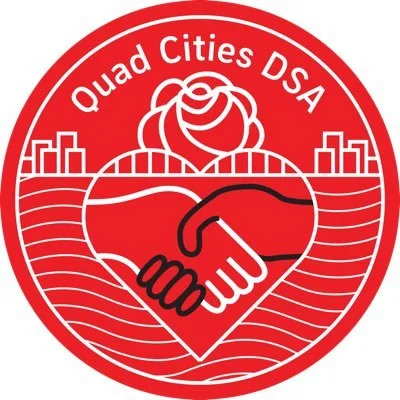

QCDSA’s Trans Right Working Group fights for trans and queer people against far-right repression






The Quad-City Worker Launches Video Platform


QCDSA Mutual Aid Distribution




Practicing Scientific Socialism: Remarks on ROC DSA’s 2025 Chapter Convention
by Gregory Lebens-Higgins
Our voices seem to matter very little in modern American democracy. Every couple years we turn out to vote, and are occasionally asked to engage with opinion polls. But much of what occurs is in spite of our expressed preference.
DSA’s capacity to organize the working class arises from its democratic structure, empowering all members to participate in shaping our movement. ROC DSA’s annual convention “is the highest assembly of the chapter,” providing members a space to elect chapter leadership and identify priorities for the following year. The 2025 Convention occurred December 13 – 14, and wrapped up at the January General Meeting.
The convention occurred in the context of America’s rising fascism, as federal agents descend on our communities to kidnap our neighbors. While in Palestine – the focus of much of the chapter’s work over the past two years – a fragile ceasefire is broken with impunity by Israel. But it also occurred among growing resistance to imperialism and its domestic reflection in the militarization of our streets.
To kick off the convention, leadership shared the achievements of 2025. Electorally, ROC DSA retained three member-endorsees to represent socialist politics on city council. The chapter strengthened connections with labor, standing in solidarity with striking grad students at the University of Rochester and forming a local Emergency Workplace Organizing Committee to help workers form unions. Recognizing that the working class includes the unemployed “industrial reserve army,” as part of the coalition Rochester Grants Pass Resistance, DSA participated in outreach and advocacy days that have also been effective for recruitment.
Within the chapter, intrepid members re-formed the Ecosocialist Solidarity Group by petition, picking up the work of founding members of the Rochester for Energy Democracy campaign. In Genesee County, our geographic branch allied with the Tonawanda Seneca Nation’s “Stop the STAMP” campaign, and confronted the threat of ICE toward farmworkers in their community. In nearby Livingston County, a developing branch began generating excitement with a May Day rally and a Teach-In to counter christian nationalist Sean Feucht. Also in Livingston County, students at SUNY Geneseo formed a YDSA chapter.
Sharpening Our Politics
By the day of convention, ROC DSA boasted 445 members in good standing – an increase of 40% over 2025. This growth was represented by a spike in resolutions submitted for consideration – more than twenty, along with several bylaws amendments. In 2024, this number was sixteen including bylaws amendments.
This was the first local convention at which a resolution was submitted on an explicitly caucused basis. Caucuses, according to A User’s Guide to DSA, are “groupings of DSA members who share a deeper ideological basis . . . and who want to advance a coherent analysis, politics, and set of proposals for DSA’s direction.” Should DSA focus primarily on electoralism? Is unionization the most effective way to organize the working class? How closely should the organization collaborate with the Democratic Party?
Even new members submitted resolutions, providing input on chapter activities and communications. Where else can one have this kind of experience? DSA creates a space where all members shape the answers to the above questions.
A growing mass movement is bound to include multiple political tendencies and members at varying stages of political development. We are allied in our struggle for working-class democracy, but our disagreements highlight issues of strategic importance. Engagement with scientific socialism means experimenting with tactics, learning from our mistakes, and adapting to conditions as they arise. These decisions are informed by democratic debate at the convention and in other DSA meeting spaces.
DSA is a Party
At the 2025 DSA National Convention, the organization passed R07: Principles for Party-Building, submitted by Marxist Unity Group. This resolution commits DSA “to the goal of becoming an independent mass socialist party.” Avoiding the irrelevance of third parties in the United States, the resolution recognizes that “a ballot line is not the primary goal or indication of political independence.” (A separate proposal to run on an independent ballot line [R33-A02] failed.) Instead, DSA must bring “our independent organization and program to races whether on a Democratic, independent, or third-party ballot line.” This strategy centers DSA in fielding and supporting candidates who represent the organization’s principles, rather than merely endorsing the most progressive Democratic candidates.
At ROC DSA’s convention, members of Marxist Unity Group motivated R05: ROC DSA Must Run a Cadre Candidate for Elected Office, asserting that “the long term goal of US socialists and DSA should be building our own political party separate from the two in power, so we can take power and build socialism.” The resolution is a response to the success of Zohran Mamdani’s campaign for Mayor of New York City, and charges the Electoral Working Group “with identifying, developing, and running a Cadre Candidate for elected office” with a campaign run and staffed by DSA members, and decisions in office made in coordination with the chapter. The resolution passed 42-8, while a competing resolution calling for the ongoing independence of endorsed candidates failed 6-45.
As with the resolution passed by National, DSA’s cadre campaign is a step toward building DSA as an independent socialist party without condemning ourselves to the current irrelevance of a third party line. These cadre campaigns will identify DSA as the representative of working class demands, winning recruits to our movement. The Democrat’s cowardice and incapacity to stop Trump, while collaborating in Palestinian genocide, has discredited the Party. We may borrow their ballot line for the time being, but DSA is developing its independent strength as a socialist political force.
Mobilizing for Democracy
Several resolutions committed to expanding the diversity of our member base to become more representative of Rochester’s working class. The negative effects of capitalism are heavily racialized, yet ROC DSA is an overwhelmingly white organization. Two resolutions seek to correct this – R19: On Multiracial Organizing, and R12: Resolution for the Improved Inclusivity of People of Color in Rochester DSA. Together, these resolutions form a Multiracial Organizing Committee, and encourage outreach to minority neighborhoods and the development of DSA literature in languages other than English. They also increase accessibility measures including childcare availability for meetings. These resolutions passed by acclamation.
Members at convention also voted to form an International Solidarity Group [R21]. The group replaces ROC DSA’s Palestinian Solidarity Group, continuing the work of divestment from apartheid while uniting anti-imperial struggles and building synergy between movements. The group is also a space in the chapter for resisting the threat of ICE, which enacts colonization upon our own cities. The convention passed R06: ROC DSA Mobilizing for Democracy, which calls for building a coalition to confront ICE, and R10: Response to ICE, calling for training to protect our community – the first is being planned for the February General Meeting.
The convention voted to augment our capacity for collaboration by forming an External Organizing Committee [R11]. This will improve communication with other groups in Rochester, distribute resources across the multi-front struggle, and ensure we are standing together at decisive moments. The activities of members acting in an official capacity within these spaces was further defined by R04: Resolution for ROC DSA’s Participation in Coalition Spaces. DSA members are called upon to provide clear identification between ROC DSA and the work of coalitions, and to encourage the development of democratic coalition structures. While working in coalition across political tendencies, DSA must ensure we approach tasks with socialist analysis and praxis – advocating for clear material demands, and maintaining a revolutionary orientation and class focus. The movement must maintain its socialist and class nature.
Of particular contention was ROC DSA’s masking policy, which has continued from the height of the pandemic. While the motivators of the resolution are concerned with alienating ‘average members of the working class’ who might be put off by masking, the sentiment that we should not lower our standards to attract wider participation won out and the masking policy was retained 21-28. The failure of the government to continue tracking COVID rates, and the crippling lack of sick days or access to health insurance means that we must protect one another using the methods available.
Building the Future
Members at convention implemented a new campaign prioritization structure that recognizes the multi-front struggle against capitalism alongside DSA’s growing capacity, while also directing resources toward a democratically selected priority campaign. The chapter’s priority campaign for the first months of 2026 is Tax the Rich, a package of legislative proposals that would redistribute wealth from multimillionaires to fund universal child care in New York State. Some members at convention expressed concerns that Tax the Rich is “not an inherently socialist campaign,” and struggles within the limits of bourgeois democracy. To avoid this outcome, the campaign must demonstrate the strength of DSA to pressure politicians, rather than acting as collaborationists. ‘Non-reformist reforms’ improve the lives of the working class, limit the power of the capitalist class, and build the capacity of the socialist movement beyond limited reforms that chip away at the capitalist structure.
The chapter also approved renewing involvement in Rochester Grants Pass Resistance, and efforts by the Labor Working Group to recruit members for unionization efforts in their workplace; as well as taking political positions against gerrymandering tactics (à la California) [R07] and the use of generative AI in chapter materials [R13].
ROC DSA is coming off incredible momentum from 2025. The Trump Administration is laying bare the stakes of the capitalist project. While we must remain flexible in responding to Trump’s agenda, we must always look toward building a socialist alternative that fully liberates the working class. The chapter is approaching its tenth anniversary in March. We will continue to struggle. We will make mistakes. But we will win. The force of collective human liberation is unstoppable.
“To accomplish this act of universal emancipation is the historical mission of the modern proletariat. To thoroughly comprehend the historical conditions and thus the very nature of this act, to impart to the now oppressed proletarian class a full knowledge of the conditions and of the meaning of the momentous act it is called upon to accomplish, this is the task of the theoretical expression of the proletarian movement, scientific Socialism.” – Lenin
The post Practicing Scientific Socialism: Remarks on ROC DSA’s 2025 Chapter Convention first appeared on Rochester Red Star.


